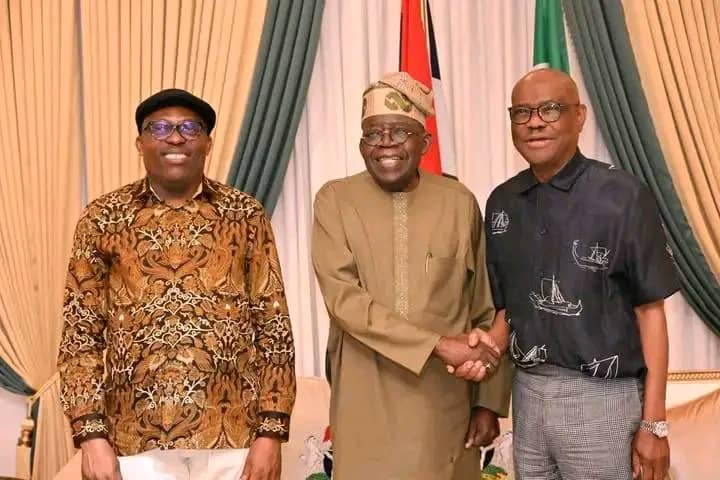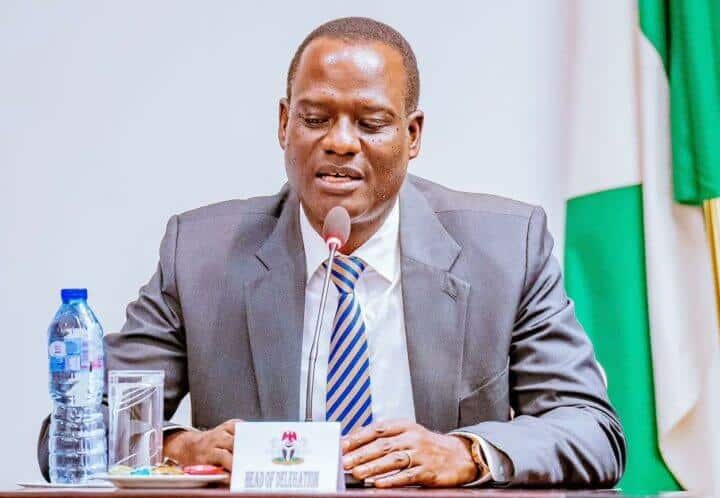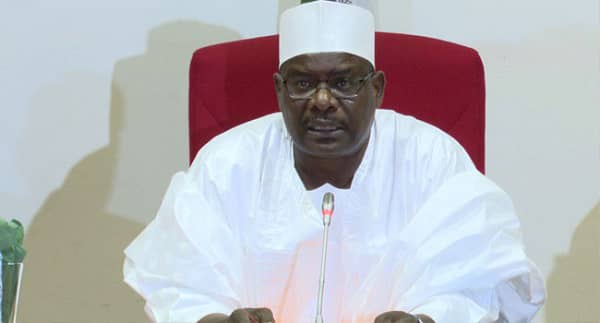President Bola Ahmed Tinubu on Thursday facilitated a high-level reconciliation meeting at the Presidential Villa, Abuja, bringing together key political stakeholders from Rivers State in an effort to resolve the months-long crisis that has crippled governance in the oil-rich state.
Present at the closed-door meeting were Rivers State Governor Siminalayi Fubara, Minister of the Federal Capital Territory and former governor of the state, Nyesom Wike, Speaker of the Rivers State House of Assembly Martins Amaewhule, and other members of the Assembly.
The meeting marked the first public appearance of Governor Fubara with President Tinubu since the president declared a political state of emergency in Rivers on March 18, 2025.
During that declaration, Tinubu suspended Governor Fubara, his deputy Ngozi Odu, and the Rivers State House of Assembly, citing their failure to cooperate and worsening security tensions in the state. The move, which was constitutionally unprecedented, deepened political uncertainty and drew criticism from civil society groups and legal experts who viewed the intervention as heavy-handed.
Thursday’s meeting, however, appeared to signal a thaw in the tensions. Photographs released by the presidency after the talks showed Tinubu, Wike, and Fubara smiling and engaging in relaxed conversation, indicating a possible breakthrough in months of strained relations. While no formal communique was issued immediately after the meeting, sources close to the presidency described the talks as “productive and conciliatory.”
According to a senior official who spoke on condition of anonymity, the meeting was aimed at uniting the warring factions and restoring normal governance in Rivers State. The source said all parties agreed to work together moving forward and to de-escalate the political standoff that has seen the state divided along rival lines of loyalty to Governor Fubara and Minister Wike.
The political crisis in Rivers State has been ongoing since late 2023 and worsened earlier this year following a sharp fallout between Fubara and Wike, his predecessor and political benefactor. Tensions escalated into a full-blown power struggle, with the State House of Assembly splitting into two factions—one loyal to Wike and another to Fubara. Attempts at mediation had previously failed, leading to legislative paralysis and threats to security.
The suspension of key officials in March by President Tinubu was intended as an emergency intervention, but critics argued it overstepped constitutional bounds and exacerbated an already fragile situation. Fubara’s political isolation deepened after the intervention, with little visible support from national leadership until this latest meeting.
In the wake of Thursday’s discussions, sources say President Tinubu emphasized unity, urging all sides to put the interests of Rivers people above personal and political ambitions. He reportedly appealed to the parties to respect democratic norms and collaborate in moving the state forward.
The involvement of Wike in the reconciliation effort has raised questions about the balance of power within the state’s political framework, particularly given his current federal role and continued influence over state affairs. However, the images released from the meeting suggest that both Wike and Fubara have agreed, at least publicly, to bury the hatchet for the sake of governance.
Political observers note that the president’s mediation may be part of a broader effort to stabilize key regions ahead of the 2027 general elections, with Rivers State being a strategic economic and electoral hub. The state, rich in oil and revenue, plays a crucial role in Nigeria’s federal economy and remains a focal point of national politics.
While the reconciliation signals hope for a resolution, it remains unclear what concrete agreements were reached regarding the structure of governance, legislative functions, or ongoing legal disputes related to the earlier suspension orders. There has been no confirmation on whether the suspension of the governor and assembly members has been formally lifted.
President Tinubu’s intervention on Thursday has drawn cautious optimism from political analysts and citizens in Rivers, many of whom have called for an immediate return to full governance and the restoration of public confidence in political institutions.
With the apparent progress made at the meeting, attention will now turn to how both Governor Fubara and Minister Wike implement the terms of reconciliation on the ground and whether the state legislature can resume its functions without renewed factional conflict.
As of press time, neither the Rivers State Government nor the Office of the FCT Minister had issued formal statements regarding the outcome of the meeting. However, the optics from the presidential villa suggest that the Tinubu-led effort may have succeeded in defusing what had become one of Nigeria’s most high-profile political standoffs.





